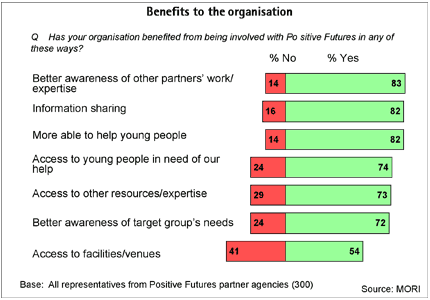Reviewing 'Positive Futures'
MORI is in its third year of evaluating and monitoring Positive Futures, which is a social inclusion initiative. The scheme aims to support some of the most at risk young people within England, by engaging them in sport and providing opportunities to access education, training and employment, and to develop key life skills.
MORI's bi-annual project audits provide the Home Office with essential information relating to the operating environment of each project, together with data and qualitative information about the type of involvement and key achievements of the young people. In some cases, the research has been used by the projects to provide evidence of their achievements, as well as identify areas where change and additional support is required. In doing so, the Positive Futures initiative can continue to grow and reach out to more young people.
In addition an annual Key Partner Survey allows the Home Office to track the role of local agencies in each project. To date, the Home Office has been able to learn which partners are most central to the sustainability and operating success of the projects. In addition, the perceptions of local agencies help to inform marketing and communication strategies. New partners are providing Positive Futures with more opportunities. In some cases, a partner agency is able to provide access to 'hard to reach' young people and refer them onto the projects. Other partnerships have resulted in the securing of additional funds e.g. through local DATs (Drug Action Teams) and PAYPs (Positive Activities for Young People).
Participation in the Positive Futures scheme has been found to have beneficial effects on young people. For example, the Key Elements research has found that staff and projects' activities can facilitate personal and social development. Prolonged involvement in sporting activities, such as team games can sometimes help to foster team building skills as well as physical and tactical abilities. In addition, evidence highlights how young people are able to gain skills and qualifications and re-engage with mainstream providers. For example, data from the last survey shows that 493 young people have returned to education, whilst 2,493 are doing better in school. A further 515 have made some other educational achievement. In addition, 607 young people have secured a job and a further 535 are now looking for one.

![]() For further information about Positive Futures, the latest Impact Report as well as the programme of on-going monitoring and evaluation can be found at: www.drugs.gov.uk/NationalStrategy/YoungPeople/PositiveFutures
For further information about Positive Futures, the latest Impact Report as well as the programme of on-going monitoring and evaluation can be found at: www.drugs.gov.uk/NationalStrategy/YoungPeople/PositiveFutures
![]() The latest Home Office Progress Report "The State of Play": www.drugs.gov.uk/ReportsandPublications/YoungPeople/1097142067
The latest Home Office Progress Report "The State of Play": www.drugs.gov.uk/ReportsandPublications/YoungPeople/1097142067
Technical details
Key Elements Survey: MORI sent out the Key Elements documents via email to 93 Positive Futures projects and 12 Nacro/Football Foundation projects in September 2004. A total of 91 Positive Futures projects and 12 Nacro/Football Foundation projects returned their Key Elements document, giving an overall response rate of 98%.
Partners Survey: MORI interviewed 300 representatives from partner organisations of Positive Futures projects by telephone, using CATI (Computer Assisted Telephone Interviewing) between 26th April and 10th May 2004. MORI set quotas by project in order to achieve representation from all partners, and have reasonable base sizes for both waves. A quota was set of between three and seven partners for each project.



